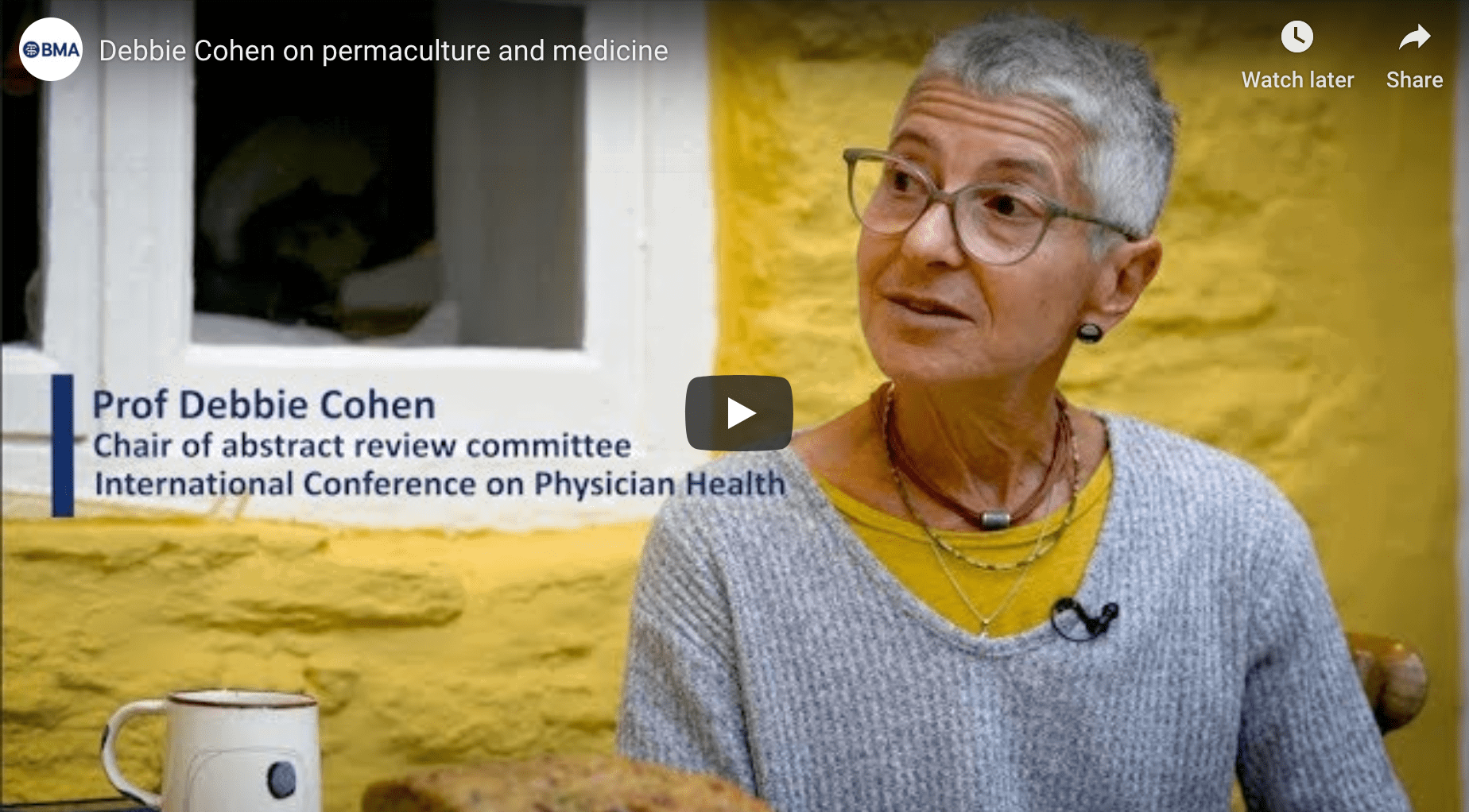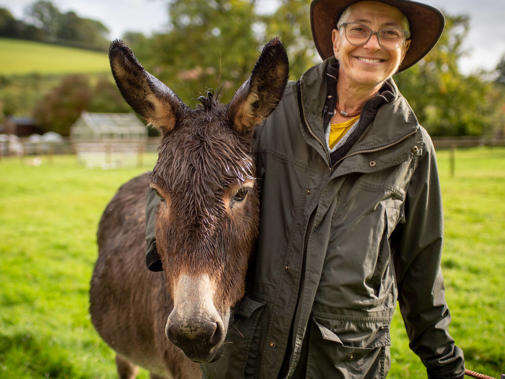
We’re heading to Debbie Cohen’s smallholding, deep in the Welsh countryside, to find out how husbandry of rare breeds and woodlands might help the medical profession she cares for so much.
‘My new found life has inspired some of my thinking about physician health,’ Professor Cohen, an occupational medicine specialist, says in her email invite. Intriguing.
Rocking about in a cab on a holey path through driving rain it’s clear these pastoral views, though barely visible, must be informing this inspiration. What could be better for you than a way of life out here?
It seemed clear but we’re way off track, just another misconception on which we’re kindly corrected around Prof Cohen’s farmhouse table, as rain hammers the roof and spills off a slaughter slab outside.
Mindfulness activities can be fine but you can’t just tell people to go on a course.
Loose talk about ‘burnout’ is one of her major bugbears. Telling doctors to be more ‘resilient’ under pressure? No, not acceptable. Sending medical students threatening letters for taking time off for mental illness? Also unacceptable. Mindfulness activities? ‘They might work,’ she says. ‘But we need to think beyond them.’
‘What does that mean?’ she jabs, then beams. ‘Mindfulness activities can be fine but you can’t just tell people to go on a course. It’s very tick-box. I talk about policies, practice, and platitudes. This is what some hospitals or medical schools do. Platitudes. We’ve done this, we’ve ticked this box, it’s OK. Well, it’s absolutely not OK.’
What are needed are interventions that are thoughtful, based on evidence, which also respect the whole ‘ecosystem’ in which doctors and medical students study and work, Prof Cohen says. ‘Junior doctors are leaving. Consultants, my age and a bit younger, are saying, I’ve had enough, I’m out of here,’ she adds. ‘We’re losing talent from both ends. There’s also lots of evidence about mental illness in doctors and medical students. We need to do more about it. What we have is not enough.’
Look after your earth and soil: make sure you understand it, know how to drain and nourish it.
Supporting doctors
Months into ‘retirement’, as she calls it, she’s as frank about the bad things facing the profession as she is positive about the good that sensible interventions can do.
Prof Cohen is widely recognised as a pioneer of physician mental health research and practice. She set up the Medic Support service for medical students and doctors in Cardiff University in 2001 and another service in Wales (called HHP Wales), more recently, which is funded by the Welsh Government and offers all doctors in Wales access to eight sessions of cognitive behavioural therapy for free.
Despite her recent September retirement, as director of student support and the Centre for Psychosocial Research, Occupational and Physician Health in Cardiff, you sense that she won’t. She’s still lead for mental health and work at the National Centre for Mental Health, Cardiff University. Her latest job is chair of the abstract review committee for the International Conference on Physician Health, organised by the BMA next September in London in conjunction with the American and Canadian medical associations.
‘Basic humanity is what the conference is about,’ she adds. ‘How we bring that back into medical culture, into any culture really?’
Her interest in caring for doctors came after the notorious Harold Shipman case, the GP from Hyde, Greater Manchester who murdered hundreds of his patients. Scrutiny and regulation inevitably intensified but without any extra help for doctors when things went wrong.
‘Back then, you only had the three wise men,’ Prof Cohen adds. ‘If you got into trouble you got tapped on the shoulder.’
But what’s this all got to do with smallholdings and husbandry?
 Debbie Cohen
Debbie Cohen
‘Invincibility’
No one working in a pressured NHS will be helped by being put on ‘resilience courses’ or by being told to ‘empty their bucket before they go to work’, she adds.
‘Treating a waterlogged field is not just about planting trees or fixing a drain. We need to start from the bottom to put the right structures in place. It needs the right seeds and grass to be sown, the water system to be understood and managed.’ If the NHS is an ecosystem in need of understanding and balance, the ethics of permaculture is a useful tool for much-needed ‘creative thinking’, Prof Cohen says.
Medicine’s culture is intertwined with the culture of the NHS and of medical education, she says. It makes as little sense to see them in isolation as to separate land, animals and trees when seeking a sustainable, resilient land.
‘You have to look at how they can work together,’ she adds. ‘Next year’s conference is an opportunity to look at how we change things.’
In medical schools, students end up absorbing a ‘hidden curriculum’ from doctors claiming ‘invincibility’.
‘They hear people say, I never get ill. Let’s laugh it all off. They think, that’s what I’ve got to be like.’ And while universities may have reams of policy about mental illness, they can be unkind to students who miss lectures or exams. ‘They’re not very thoughtful in what they say, how they say it,’ she says.
‘All you need to do is say, Thank You,’ she adds, spelling out a more humane way. ‘For getting in contact with me. I’m sorry that you’re not well at the moment. I appreciate that you’re doing everything you can to get better. What can I do to help? It’s not difficult is it?’
Trainees often feel vulnerable, their consultants forever assessing them.

One doctor told me, I thought I was a ninja, but actually, I’m a Buddha. Isn’t that lovely?
Her care of rare breeds, such as Soay and Boreray sheep from the isolated Scottish archipelago of St Kilda, links with a long-held interest in human behaviour and communication. ‘You can’t herd Soays with a dog,’ she says. ‘You learn how to manage them by understanding their behaviours.’
Prof Cohen has also studied doctors’ behaviour. In 2004, she studied GP behaviour when writing ‘sick notes’ (before they became ‘fit notes’) for her MD. Her interest now lies in helping doctors and medical students survive and thrive in the NHS.
Such work informs her courses for medical students and junior doctors in communication and emotional intelligence, how to handle inevitable feelings of anger, frustration and upset which come with the job.
‘Trainees often feel vulnerable, their consultants forever assessing them,’ she says. She helps them find strategies for managing these sometimes-difficult relationships.
‘One doctor told me, I thought I was a ninja, but actually, I’m a Buddha’
There’s something from her childhood too which steers this interest in communication and behavioural change. As one of five children (now, all doctors) of notable psychoanalyst and psychiatrist Norman Cohen, she spent years as a child in analysis herself until ‘I rebelled’.
‘My father was an amazing man,’ she says. ‘He was the one who said, follow your heart, be independent,’ she adds with a bang of the table.
She started her career at Charing Cross Medical School in the seventies and trained as a GP in Oxford. She followed her husband Professor Sir Michael Owen, a highly respected research psychiatrist, to Wales before a stint as an agony aunt for Practical Parenting magazine. She retrained in occupational health after their son fell ill, working for Marks & Spencer, General Electric, and Greggs bakery.
‘It’s been a long journey,’ she says, back in the farmhouse, back at the table. ‘But we need to move on. What we’ve been doing hasn’t worked. Doctors leaving in droves. People say, we’ve got the services, we’re OK. Well, no, we’re not,’ she adds. ‘Because why are people still killing themselves? Why are people still saying, where can I go to get help?’

